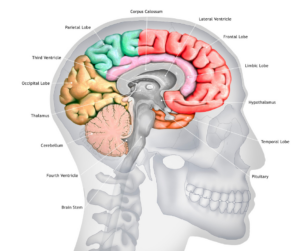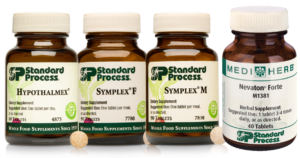By Claire Bacon, ACN, CNC
As we come off a high from the Thanksgiving holiday, you might be wondering – “How can I keep this happy gratitude mindset going all through the holidays?” You probably loved having a few days away from the office, with more time to relax and spend unscheduled hours with your family. Do you feel more clear in your headspace? More hopeful and optimistic?
It’s not your imagination. Whether you spent your extra free time chilling with friends or working out solo, the break in routine feels good – and IS good for you, too. Changing up your environment also changes your mental stress level. And when you’re less stressed, everything physical in your body works better, too. It’s because of reducing the demands on your stress perception center – the hypothalamus gland. Reducing stress allows the hypothalamus to communicate with the rest of the endocrine system better, too.
First, what are all these big words, and how do they impact my happiness?

Endocrine 101
The endocrine (or hormonal) system is the most powerful control system in the human body. The endocrine system is made up of glands that produce hormones. These hormones act as signals that affect cellular function throughout the body. The hormones must be balanced in order to optimize the body’s powerful systems of repair and self-healing.
Your endocrine system generally consists of the hypothalamus, pituitary, adrenals, thyroid, pancreas, and gonads (ovaries and testes). The hypothalamus is the most “upstream”, meaning, it is like the “master conductor” that perceives and signals to every one of the other glands. You could say the hypothalamus is the “bridge” between the nervous system (stress response) and the endocrine system (hormones). You want your hypothalamus to be alert and in tune with your surroundings, able to signal down to the pituitary, thyroid, and gonads, and listen to their feedback, as needed.

Unfortunately, sometimes the events that happen in life have a detrimental effect on how the hypothalamus works. It’s because the hypothalamus is triggered by thought, and manifests that thought in the body through the hormones. Particularly, when we go through traumas, the hypothalamus can be negatively affected.
Imagine you witness something very traumatic – like a car accident up ahead that you can’t do anything about. Although you physically weren’t hurt, you may feel physical effects (crying, shaking, panic) for the remainder of the day, or even longer. What’s worse, is that sometimes the hypothalamus doesn’t recover, and one traumatic event may lead to months or years of hormonal imbalance. The emotional trauma can impact the H-P-A axis signaling. And this can lead to further problems, including chronic anxiety, digestive problems, anger issues, and/or depression.
Gratitude Mindset and Brain Health
When we experience mental, emotional, or physical traumas, our “perception center” can sometimes take the fall. In fact, many Americans live in a chronic state of glandular depression and hormonal disruption. We know this because of the massive numbers of people on anti-depressant drugs. But it doesn’t have to be this way!
Because we know the hypothalamus is triggered by thought, we can choose to set our thoughts wisely – and improve our health!
According to Steven Covey, we create our experiences through our conscious attitudes and expression. In a difficult situation you might say, “I choose to have a meaningful and creative experience through my conscious choices in the moment” rather than giving in to an outburst. For example, instead of getting angry in traffic, you might feel grateful that the holdup has kept you safe from driving too fast and having an accident. The mental exercise is whether we choose to consciously respond or intuitively react.

The main ways to improve hypothalamus function and brain health are:
- Make a mental shift to open up to a larger sense of who we are (identity);
- Choose compassion in how we see situations (perception);
- Give most of our attention to what is right with ourselves and others;
- Maintain an attitude of thankfulness, gratitude and appreciation;
- Express kindness and integrity in our relationships, and
- Eat a nutrient-dense, low-glycemic, whole-foods diet.
Plant Foods as Medicine
Plants – specifically herbs – have adapted to changes in their environment over enormous amounts of time. Eating certain herbs with adaptive properties helps increase our resilience to the modern world. Without support for our own adaptation, our mind-body connection may not function properly. Over time, we may lose our ability to thrive in our stressful environment. But by including key nutrients and herbs, we have a better chance of staying well.

Top nutrients for brain support include:
- Healthy fats from fish oil, like anti-inflammatory EPA and DHA
- Resveratrol because of its benefits on the SIRT1 gene and mitochondrial activity;
- Increased heat shock proteins through saunas, sweating, and exercise;
- Bitter foods and herbs for stimulating NRF2 – curcumin, bitter chocolate, and cruciferous vegetables;
- Rhodiola and other adaptogenic herbs like Ashwagandha and Bacopa
- Nervine herbs like Skullcap and St. John’s Wort
“For every human illness, somewhere in the world there exists the plant, which is the cure.”
Rudolf Steiner, Austrian philosopher
Supplements to Support a Gratitude Mindset
The purpose of supplements is to gain the benefit of nutrients you wouldn’t normally get in your diet. Unless you’re regularly consuming unusual organ meats from your butcher shop, you’re not getting this kind of specific support. These vitamins are our favorites for improving H-P-A axis signaling and hypothalamus function. When your mood and hormones have been less than great, consider these…

- Hypothalmex – supplies the nutritional “nuts and bolts” necessary to help the hypothalamus gland work. It helps to pick up a sluggish hypothalamus that doesn’t seem to be paying attention to what the rest of the system is doing.
- Symplex M (for males) or Symplex F (for females) – contains extracts of the adrenals, thyroid, pituitary, and gonads. It’s one of our best foundational supports for general health and wellbeing of the endocrine system.
- Nevaton Forte – is an herbal complex for mood support. Contains Saffron, Schisandra, Skullcap, and St. John’s Wort – adaptogenic and nervine herbs that support the stress response and improved mood.
Final Thoughts
Keeping an eye out for hypothalamus support can be a powerful enhancement to our mood and our ability to express gratitude. If you tend to bow under the pressure of the holidays, consider adding some endocrine support, and see how much better you do!
You may find it easier to keep your cool and your mood up whether you’re out in traffic, holiday shopping, or while journaling at home!
Gratitude is a gift to others with benefits to yourself!



